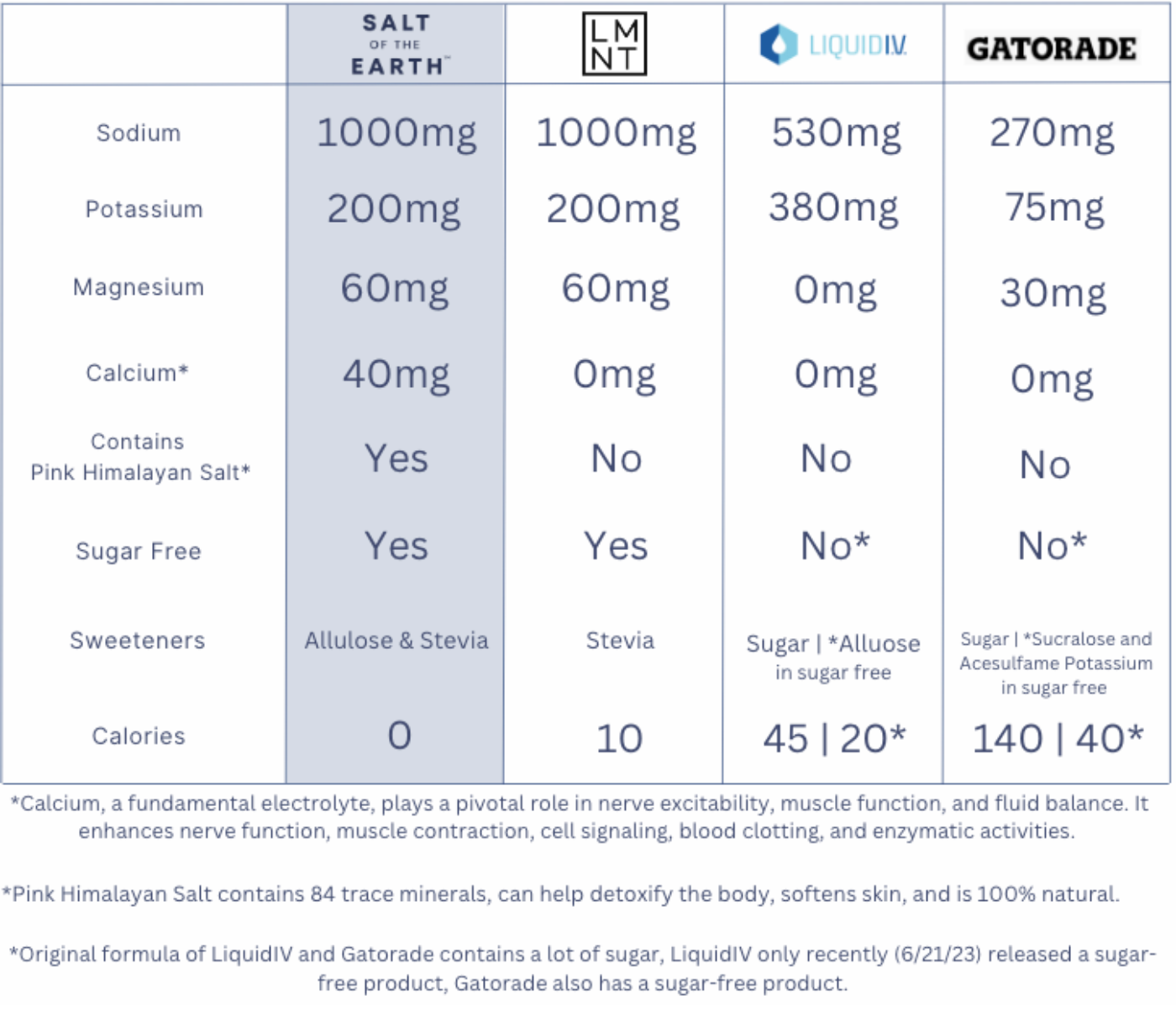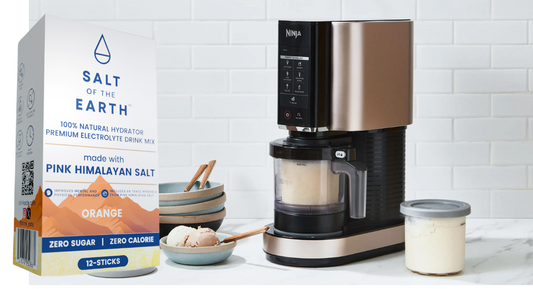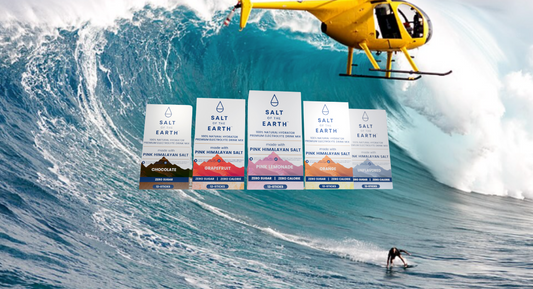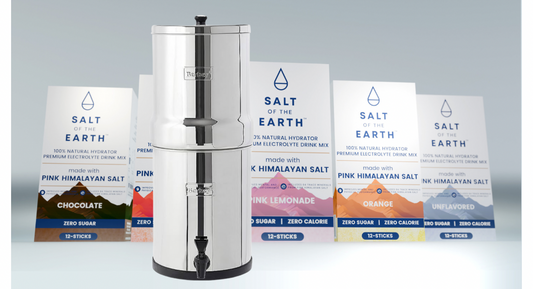
-
Salt of the Earth | Natural Electrolytes | Pink Lemonade
5.0 / 5.0
(40) 40 total reviews
Regular price From $7.99 USDRegular priceUnit price / per -
Salt of the Earth | Natural Electrolytes | Orange
5.0 / 5.0
(25) 25 total reviews
Regular price From $7.99 USDRegular priceUnit price / per -
Salt of the Earth | Natural Electrolytes | Grapefruit
Regular price From $19.99 USDRegular priceUnit price / per -
Salt of the Earth | Natural Electrolytes | Chocolate
Regular price From $19.99 USDRegular priceUnit price / per -
Salt of the Earth | Natural Electrolytes | Unflavored
Regular price From $19.99 USDRegular priceUnit price / per -
Salt of the Earth | Natural Electrolytes | Variety Pack
Regular price From $94.99 USDRegular priceUnit price / per$99.95 USDSale price From $94.99 USDSale
Merch
-
Tumbler 20oz
Regular price $20.97 USDRegular priceUnit price / per -
Unisex Heavy Blend™ Hooded Sweatshirt
Regular price From $20.55 USDRegular priceUnit price / per -
20oz Insulated Bottle
Regular price $19.12 USDRegular priceUnit price / per -
Classic Tee
Regular price From $13.78 USDRegular priceUnit price / per -
Kiss-Cut Stickers
Regular price From $1.40 USDRegular priceUnit price / per -
Kiss-Cut Stickers
Regular price From $1.40 USDRegular priceUnit price / per
Sodium, the most important electrolyte
Sodium is responsible for driving water into your cells, if you don't have enough sodium in your water you won't get properly hydrated.
YOU NEED MORE SALT, NOT LESS.
9 Reasons Why You Need More Salt Not Less
1. Electrolyte Balance: Salt (sodium chloride) is a critical electrolyte that helps maintain the balance of fluids in and around your cells. Adequate salt intake supports proper hydration and prevents dehydration.
2. Blood Pressure Regulation: Sodium plays a role in regulating blood pressure. In some individuals, especially those with low sodium levels, increasing salt intake can help stabilize blood pressure and prevent orthostatic hypotension (low blood pressure when standing).
3. Muscle Function: Sodium is essential for muscle contraction and nerve signaling. Insufficient salt intake can lead to muscle cramps and impaired muscle function.
4. Preventing Hyponatremia: Low sodium levels in the blood, known as hyponatremia, can lead to symptoms like fatigue, weakness, nausea, and confusion. Adequate salt intake is crucial to prevent this condition.
5. Balanced Diet: Salt is a natural flavor enhancer that can make foods more palatable. Including some salt in your diet can help you enjoy a balanced and nutritious diet by making healthy foods more appealing.
6. Individual Variability: Salt requirements vary from person to person. Some individuals may need more salt due to age, activity level, climate, and genetics.
7. Endurance Activities: If you engage in vigorous or endurance activities, you may lose significant amounts of salt through sweat. Replenishing these lost electrolytes, including sodium, is essential to maintain performance and prevent cramping.
8. Hormone Regulation: Adequate sodium intake is essential for producing and regulating hormones in the body, including those that control blood pressure and fluid balance.
9. Kidney Health: Some medical conditions, such as kidney disease, can lead to excessive sodium loss in the urine. In such cases, controlled salt intake may be necessary but should be done under medical supervision.

Compare us to the competition
We have a similar formula ratio as LMNT, but with calcium, better Salt, and we taste better
Blog posts
View all-

How to Make Orange Electrolyte Ice Cream (No Ad...
Looking for a guilt-free way to enjoy dessert and stay hydrated? Try our Orange Electrolyte Ice Cream recipe with no added sugar - a creamy delight that's as nutritious as...
How to Make Orange Electrolyte Ice Cream (No Ad...
Looking for a guilt-free way to enjoy dessert and stay hydrated? Try our Orange Electrolyte Ice Cream recipe with no added sugar - a creamy delight that's as nutritious as...
-

The Vital Role of Hydration for Surfers and Eve...
Discover the crucial importance of staying hydrated, whether you're catching waves or just going about your day. Learn why Salt of the Earth Electrolytes is a game-changer for optimal hydration.
The Vital Role of Hydration for Surfers and Eve...
Discover the crucial importance of staying hydrated, whether you're catching waves or just going about your day. Learn why Salt of the Earth Electrolytes is a game-changer for optimal hydration.
-

The Essential Role of Electrolytes in a Berkey ...
In our pursuit of purity and wellness, the Berkey water filtration system stands out as a beacon of clean, uncontaminated water. However, this purification process, as thorough as it is,...
The Essential Role of Electrolytes in a Berkey ...
In our pursuit of purity and wellness, the Berkey water filtration system stands out as a beacon of clean, uncontaminated water. However, this purification process, as thorough as it is,...
FAQ
Isn't too much salt/sodium bad for you?
No. Salt is a superfood.
The latest research suggests 5,000-7,000mg of sodium. Which is equal to about 12.5g-17.5g of salt. 2.5-3.5 teaspoons of salt.
Also, Dr. James DiNicolantonio and Dr. Andrew Huberman's daily recommendation is at least 8-12 grams of salt, double the standard recommended Salt intake amount.
If you are dealing with prehypertension or already eating a lot of salt in your diet, this may not be your product.
What are the benefits of electrolytes?
Electrolytes are essential for maintaining hydration, especially during and after physical activity when the body loses fluids and minerals through sweat. Electrolytes help replenish the lost fluids and prevent dehydration, cramps, fatigue, and heat-related illnesses. Electrolytes also support normal muscle function, nerve transmission, blood pressure, and pH balance.
Who should use electrolytes?
Anyone who engages in moderate to intense exercise, especially in hot or humid conditions, can benefit from electrolyte products to prevent dehydration and enhance performance. Electrolyte products can also be helpful for people who have certain medical conditions that cause fluid loss, such as diarrhea, vomiting, fever, or kidney disease.























